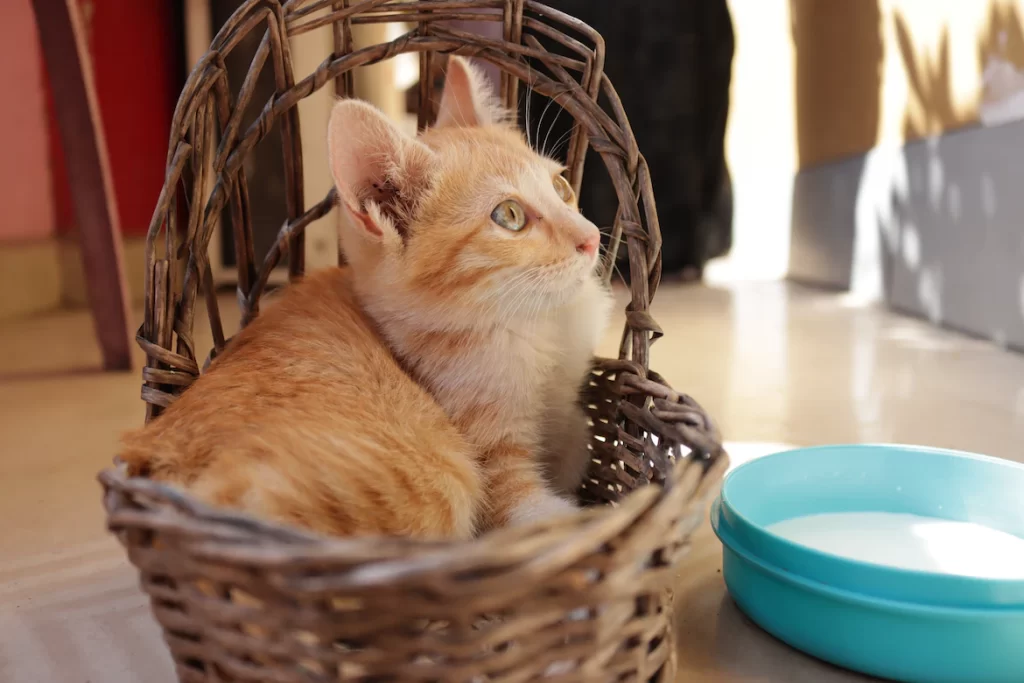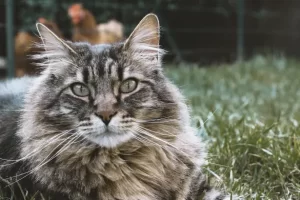Last updated on January 16th, 2023 at 02:26 am

As cat parents, we would do anything to ensure that our kitten is always happy and healthy. We offer them toys, we spend time with them, we play with them, we groom them on a regular basis, and we pay special attention to their diet. If you’re dairy-free or vegan, you probably have some almond milk in your refrigerator right now. You might be wondering, can cats drink almond milk?
The short answer is that cats can drink almond milk, but only in moderation. Almond milk is a plant-based beverage comprised of water and almonds. It is lactose and dairy-free, making it an excellent choice for lactose-intolerant cats. In reality, your cat can have almond milk once a month in moderation. Let’s talk about how much your cat can handle without becoming ill, as well as your alternative options.
What exactly is almond milk?
Almond milk is a nutrient-dense beverage made from almond kernel. It contains critical vitamins and minerals that the body requires. Even though it lacks protein and certain other vitamins and minerals found in dairy milk, it is still a healthy option for humans. When it comes to our cats, though, it is not a natural element of their diet. Cats are obligate carnivores that require animal proteins to survive. Almond milk lacks the necessary nutrients to be incorporated into a daily diet.
Nutritional information for almond milk
Almond milk is a dairy-free milk substitute produced from almonds and water. It is naturally dairy- and lactose-free, making it a good choice for cats who are lactose intolerant or sensitive to lactose. One cup of almond milk contains:
- 39 calories
- 3 grams of fat
- 1 gram protein
- 5 grams Carbohydrates
- 5 grams fiber
- 24% of the Daily Value (DV) for Calcium
- Potassium: 4% of the Daily Value (DV)
- 18% of the Daily Value (DV) for vitamin D
- 110% of the Daily Value (DV) for vitamin E
Is almond milk safe for cats to consume?
You may have heard that cats adore milk. However, they cannot digest milk as easily as humans. Cats cannot create enough lactase enzymes, which are required for milk digestion, and this can result in lactose intolerance symptoms like diarrhea or vomiting.
If your cat enjoys milk but cannot digest lactose, almond milk can be a good substitute. However, you must exercise caution because nut-based milk can upset the stomachs of some cats. Also, be sure that you only let your cats drink almond milk in moderation.
Furthermore, make certain that the brand you choose is safe for your cat. Flavored almond milk should be avoided since it contains flavorings, preservatives, and artificial sweeteners that can upset your feline friend’s stomach. If you do decide to feed almond milk to your cat, it must be unsweetened and flavorless.
Be cautious of sweeteners that have been added
Sugar is not something that should be given to cats. You probably weren’t aware of this, but your cats can’t even taste sweet things. It is correct. Cats have appetites that are best satisfied by diets that are primarily composed of meat, and they want nothing else. Because of this, anything as simple as a recently opened and smelly can of tuna might stimulate their senses.
However, this does not rule out the possibility that certain peculiar cats enjoy eating sugary treats. You need to be very careful about the types of sweeteners that are called for in the recipe. While sugar made from cane is perfectly safe for pets, certain goods contain artificial sweeteners like xylitol which are extremely hazardous to their health.
Almond milk for kittens
If you have a kitten that for some reason wasn’t properly weaned, you might be seeking different options on what to feed them. You may be aware that drinking milk from cows isn’t the finest option; nonetheless, do you think drinking almond milk will be sufficient? The correct response is “no.” You shouldn’t give them any alternative human milk because it can’t compare to the milk their mother gave them.
There are milk substitutes for kittens that are sold in many stores and may also be purchased online. These milk substitutes have been developed specifically for the weaning process. You should never make any substitutions, because it may result in a sickly kitten that may not survive after all.
Also read: Homemade Milk For Kittens Formula
Are almonds toxic to cats?
It has been determined by the American Society for the Prevention of Cruelty to Animals (ASPCA) that cats and other pets are not at risk of harm from consuming sweet almonds. On the other hand, they have the potential to produce digestive problems such as nausea, vomiting, diarrhea, and even pancreatitis in certain people.
Bitter almonds, on the other hand, are known to be hazardous to the health of pets due to the presence of a cyanide chemical in them. Natural food stores are the only places in the United States where you may buy bitter almonds, and they have to label them as bitter if they do. Bitter almonds are not widely available for purchase in the United States.
What are the benefits of almond milk for cats?
Because it does not contain lactose, almond milk is a good option for cats that struggle to digest the milk enzymes. Vitamin E, which is abundant in almond milk, is beneficial for maintaining the health of your cat’s skin and coat. Vitamin E’s anti-inflammatory effects are helpful in treating skin diseases like eczema. This is another one of vitamin E’s many advantages. Almond milk also contains potassium, which is beneficial to cellular function, and magnesium, which is beneficial to bowel motions as well as urinary difficulties. In addition, it is an excellent source of minerals zinc, riboflavin, and selenium.
It is usual practice to add vitamin D and calcium to this product in order to make it nutritionally equivalent to cow’s milk. Because it has so few carbohydrates, consuming it — even in its unsweetened form — will have no impact on your blood sugar levels. Carefully read the label to ensure that the product you are purchasing does not include any artificial substances or sweeteners.
What is the maximum amount of almond milk that you should give your cats?
When introducing a new human meal to your cat, you should always start with a tiny amount and observe how they react to the food before increasing the serving size. You can begin by giving them only a few teaspoons, then wait and observe how they react while you do so. If you do not have any adverse reactions at all, you are free to increase the dose, but you should never exceed the recommended maximum.
It is not a good idea to provide almond milk to your cat as a dietary supplement since the cat food that you feed your cat should meet all of its dietary needs; therefore, it is not a good idea to give almond milk to your cat. Keep in mind that the percentage of your cat’s total daily calorie intake that should come from treats and foods that aren’t well balanced should be less than 10%. Therefore, it will be a good idea to let your cats drink almond milk no more frequently than once every few days and no more than half a cup at a time.
What are some of the possible dangers involved in giving almond milk to cats?
In most cases, the only time that giving your cat almond milk could be harmful to their health is if you gave them an excessive amount. Experts say that cats require between 24 to 35 calories per day for every pound in order to maintain a healthy weight. So, a 10-pound cat should consume between 240 and 350 calories per day, and 1 small cup of almond milk can provide between 30 and 60 calories. Consuming an excessive amount of almond milk might cause discomfort in their digestive system, which can lead to:
- Bloating and gas
- Diarrhea
- Abdominal pain
- Vomiting
After your cats drink almond milk, if you find that they are exhibiting any of these above signs, you should either decrease the amount they drink and monitor them more closely for signs of illness or, even better, you should stop giving them almond milk altogether.
What other kinds of milk can my cats drink?
If you want to start giving your cat milk as a regular part of their routine, you should give the kind that is both risk-free and rich in nutrients The following are some options that you could think about:
- Plant-based milk: Making the switch to non-dairy milk is essential if you want to ensure your cat’s well-being and safety. You should think about using milk alternatives such as almond milk, coconut milk, soy milk, oat milk, and even rice milk. In comparison to cow’s milk, they do not have any lactose and have a lower total fat and calorie content. Avoid purchasing plant-based milk from grocery stores that contain preservatives, artificial flavors, or sweeteners. These plant-based milk should be avoided at all costs.
- Milk from goats and sheep: Compared to cow’s milk, milk from goats and sheep has a lower lactose content. Because of this, there is no risk of lactose intolerance in cats even if they consume a greater quantity.
What type of milk my cat shouldn’t drink?
As a cat owner, you should never give your cat cow’s milk and condensed milk. They are known to create discomfort in the abdomen region due to the high levels of sugar and fat that they contain. Chocolate milk is also one thing that you should avoid giving your cats. Chocolate milk includes theobromine, a poisonous chemical that can be harmful to pets when used as a milk substitute.
How to make almond milk at home for your cat?
If you want to be on the safe side, you can just create almond milk for your cat rather than buying commercially made almond milk. It’s simple and easy.
Ingredients required:
- 4 cups of spring water
- 1 cup natural almonds
- Strainer
- Blender
- Storage container
Method.
1. Soak the almonds overnight, then drain and add to the mixer.
2. Pour in the water and blend for about a minute, or until the mixture is smooth.
3. Pour the milk into your storage container.
4. The milk is ready to drink and can be refrigerated for up to 5 days.
Conclusion
Even while letting your cats drink almond milk isn’t going to hurt them (that is unless they have an allergy to almonds), you shouldn’t go out of your way to do so. Because of the fact that cats meet all of their nutritional and liquid needs through the food and water they consume, giving them almond milk does not provide them with a significant benefit in the long run.
An upset stomach or even weight gain can occur in cats if they consume an excessive amount of almond milk. If you have any concerns, consult your veterinarian, and put the almond milk aside for your own pleasure.


